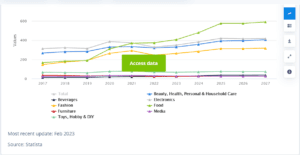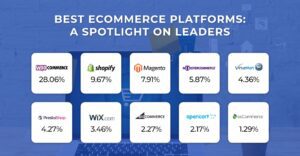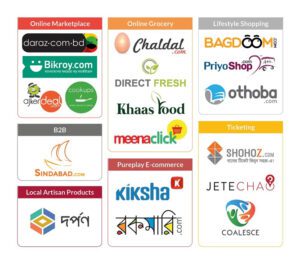
Ecommerce web development in Bangladesh 2023. Trends, challenges, possibilities & solutions.
I. Introduction
- Briefly introduce the topic of ecommerce web development in Bangladesh.
E-commerce web development refers to the creation of online shopping websites that allow businesses to sell their products and services to customers over the internet. In Bangladesh, e-commerce has become increasingly popular in recent years due to the growth of internet usage and the increasing adoption of digital payments. The country has a rapidly growing e-commerce market, with both local and international businesses setting up online stores to cater to the needs of the Bangladeshi population. E-commerce web development companies in Bangladesh provide a range of services including website design and development, payment gateway integration, and digital marketing to help businesses establish and grow their online presence.

- Highlight the growing importance of ecommerce in the country’s business landscape.
E-commerce is rapidly growing in Bangladesh’s business landscape, with a significant increase in online shopping, digital payment systems, and the emergence of e-commerce platforms. Here are some points that highlight the growing importance of e-commerce in Bangladesh:
- E-commerce market size: The e-commerce market in Bangladesh was valued at $3.5 billion in 2020 and is expected to grow to $10 billion by 2025, with a compound annual growth rate (CAGR) of 28%. (Source: e-Conomy SEA 2020 report)
- Increasing internet and mobile penetration: The growing internet and mobile penetration rates in Bangladesh have contributed to the growth of e-commerce in the country. As of January 2021, there were over 100 million internet users and more than 165 million mobile phone users in Bangladesh. (Source: Bangladesh Telecommunication Regulatory Commission)
- Government initiatives: The Bangladesh government has taken several initiatives to promote e-commerce in the country, such as launching the Digital Commerce Policy in 2018, setting up the Bangladesh e-Commerce Association in 2019, and offering various incentives to promote the growth of the sector. (Source: The Daily Star)
- COVID-19 pandemic: The pandemic has accelerated the growth of e-commerce in Bangladesh, with a significant increase in online sales during the lockdown period. According to a report, the e-commerce market grew by 70% in the first three months of the pandemic. (Source: Bangladesh Association of Software and Information Services)
- Job creation: E-commerce has the potential to create a significant number of jobs in Bangladesh. As of 2020, the sector had created around 200,000 jobs, and it is projected to create 1.3 million jobs by 2025. (Source: e-Conomy SEA 2020 report)
Overall, the above statistics highlight the growing importance of e-commerce in Bangladesh’s business landscape, with significant potential for growth, job creation, and contribution to the country’s economy.
Ecommerce Bangladesh highlights: Source Statista
- Revenue in the eCommerce market is projected to reach US$8.45bn in 2023.
- Revenue is expected to show an annual growth rate (CAGR 2023-2027) of 15.90%, resulting in a projected market volume of US$15.24bn by 2027.
- With a projected market volume of US$1,487.00bn in 2023, most revenue is generated in China.
- In the eCommerce market, the number of users is expected to amount to 86.08m users by 2027.
- User penetration will be 37.9% in 2023 and is expected to hit 47.9% by 2027.
- The average revenue per user (ARPU) is expected to amount to US$128.80.
II. The Benefits of Ecommerce Web Development for Businesses in Bangladesh
There are several advantages that businesses in Bangladesh can enjoy by having an ecommerce website. Here are some of the key benefits:
- Increased reach and accessibility: An ecommerce website allows businesses to reach customers beyond their physical location, making it easier to expand their customer base. Customers from anywhere in the world can access and purchase products from the website.
- 24/7 availability: Unlike traditional brick-and-mortar stores that have specific operating hours, ecommerce websites are open 24/7. This means that customers can shop at any time that is convenient for them, increasing the likelihood of sales.
- Cost-effective: Setting up an ecommerce website can be cost-effective compared to traditional stores. Businesses can save money on rent, utilities, and other operational costs.
- Greater customer insights: Ecommerce websites can provide businesses with valuable insights into their customers’ behavior, such as what products they are interested in, how long they spend on the website, and what pages they visit. This information can help businesses optimize their marketing and sales strategies.
- Increased sales and revenue: Ecommerce websites can generate higher sales and revenue for businesses by making it easier for customers to make purchases. With the ability to reach a larger audience, businesses can increase their customer base and generate more sales.
- Improved customer experience: Ecommerce websites can provide a more convenient and personalized shopping experience for customers. They can browse products at their own pace, access detailed product information, and easily make purchases online.
- Easy to track and measure: Ecommerce websites provide businesses with detailed analytics and tracking tools to measure the effectiveness of their marketing campaigns, sales, and customer engagement. This allows businesses to make data-driven decisions to improve their online presence and increase sales.

Overall, having an ecommerce website can provide businesses in Bangladesh with a competitive advantage in today’s digital age by increasing reach, improving customer experience, and generating more sales and revenue.
III. The Process of Ecommerce Web Development in Bangladesh
The key steps involved in ecommerce web development in Bangladesh.
Developing an ecommerce website requires careful planning and execution. Here are the key steps involved in ecommerce web development in Bangladesh:

- Planning: The first step in ecommerce web development is to plan the website’s structure, features, and functionality. This includes defining the website’s goals, target audience, and marketing strategy. It also involves identifying the key features and functionality needed to support the website’s objectives, such as product catalogs, shopping carts, payment gateways, and shipping options.
- Design: Once the planning is done, the next step is to design the website’s user interface and overall visual appearance. The design should be visually appealing, easy to navigate, and aligned with the brand’s identity. It’s essential to ensure that the design is responsive, meaning it can adjust to different screen sizes and devices.
- Development: In this step, the website’s functionality is implemented by developing the backend and frontend code. Backend development includes creating the database, setting up the server, and integrating payment and shipping systems. Frontend development involves designing and coding the website’s user interface, ensuring that it’s responsive and user-friendly.
- Testing: Once the website is developed, it’s important to test it thoroughly to ensure that it’s functioning as expected. This includes testing the website’s functionality, speed, security, and usability. It’s crucial to identify and fix any bugs or issues before the website goes live.
- Launch: After testing, the website can be launched. This involves uploading the website to the server, configuring the domain name and email addresses, and integrating any third-party tools or services. The launch should be carefully planned and executed to ensure a smooth transition to the live environment.
- Maintenance: Once the website is live, it requires ongoing maintenance and updates to ensure that it’s secure, functional, and up-to-date. This includes monitoring the website’s performance, updating software and plugins, and adding new features or functionality as needed.
In summary, the key steps involved in ecommerce web development in Bangladesh include planning, design, development, testing, launch, and maintenance. By following these steps, businesses can build a successful ecommerce website that meets their goals and objectives.
- The importance of working with a professional web development company to ensure a smooth and successful process.
Developing an ecommerce website requires specialized skills, expertise, and experience. Working with a professional web development company can help ensure a smooth and successful process. Here are some reasons why it’s important to work with a professional web development company for ecommerce web development:
- Expertise: Professional web development companies have the expertise and experience needed to develop a high-quality ecommerce website. They have a team of skilled developers, designers, and project managers who can work together to ensure that the website meets the client’s goals and objectives.
- Customization: Professional web development companies can provide customized solutions that meet the specific needs of the client. They can work closely with the client to understand their requirements and develop a website that aligns with their brand identity and business objectives.
- Quality assurance: Professional web development companies have a rigorous quality assurance process to ensure that the website is free of errors, bugs, and issues. They test the website thoroughly before launching it to ensure that it’s functioning as expected and meets the highest standards of quality.
- Timeliness: Professional web development companies have the resources and expertise to develop an ecommerce website within a reasonable timeframe. They can manage the project efficiently and ensure that the website is delivered on time and within budget.
- Support: Professional web development companies provide ongoing support and maintenance services to ensure that the website is up-to-date, secure, and functional. They can provide technical support, software updates, and security patches to keep the website running smoothly.
In conclusion, working with a professional web development company is essential for ecommerce web development. It ensures that the website is developed to the highest standards of quality, meets the client’s specific needs, and is delivered on time and within budget. By choosing a professional web development company, businesses in Bangladesh can build a successful ecommerce website that drives sales and growth.
IV. Popular Ecommerce Platforms in Bangladesh
- The most popular ecommerce platforms used in Bangladesh
In Bangladesh, there are several popular ecommerce platforms used by businesses to build and manage their online stores. Here are the three most popular ecommerce platforms used in Bangladesh:
- The most popular ecommerce platforms used in Bangladesh
- Shopify: Shopify is a cloud-based ecommerce platform that allows businesses to create an online store quickly and easily. It offers a range of features, such as inventory management, payment processing, shipping, and order tracking. Shopify is popular among small and medium-sized businesses in Bangladesh due to its ease of use, affordability, and scalability.
- WooCommerce: WooCommerce is a popular ecommerce platform for businesses using WordPress as their content management system (CMS). It offers a range of features, such as product management, payment processing, and shipping options. WooCommerce is popular among businesses in Bangladesh due to its flexibility, customization options, and integration with WordPress.
- Magento: Magento is an open-source ecommerce platform that offers a range of features, such as product management, payment processing, and shipping options. It’s designed for medium to large businesses and offers a high level of customization and scalability. Magento is popular among larger businesses in Bangladesh due to its advanced features, robust functionality, and ability to handle high volumes of traffic and sales.
Each ecommerce platform has its own strengths and weaknesses, and businesses in Bangladesh should choose the one that best meets their needs and objectives. Shopify, WooCommerce, and Magento are all popular and widely used ecommerce platforms in Bangladesh, and businesses should evaluate them carefully before making a decision.
- Compare and contrast their features, pricing, and suitability for different types of businesses.here’s a comparison of the features, pricing, and suitability for different types of businesses for the three most popular ecommerce platforms in Bangladesh: Shopify, WooCommerce, and Magento.
- Shopify: Features:
- User-friendly interface
- A range of customizable themes and templates
- Built-in payment and shipping options
- Integration with social media and third-party applications
- Mobile-responsive design
- Advanced analytics and reporting tools
Pricing:
- Basic Shopify: $29/month
- Shopify: $79/month
- Advanced Shopify: $299/month
Suitability:
- Best for small to medium-sized businesses with limited technical expertise
- Ideal for businesses that want a user-friendly platform with built-in payment and shipping options
- Suitable for businesses that want to sell products on social media channels
- WooCommerce: Features:
- Open-source platform
- Integrates with WordPress CMS
- A range of customizable themes and templates
- Built-in payment and shipping options
- Large library of plugins and extensions
- Mobile-responsive design
Pricing:
- WooCommerce is free, but businesses will need to pay for web hosting, domain name, and any premium themes or extensions.
Suitability:
- Best for businesses with some technical expertise and familiarity with WordPress
- Ideal for businesses that want a flexible and customizable platform
- Suitable for businesses that want to build a content-rich website with ecommerce capabilities
- Magento: Features:
- Open-source platform
- A range of customizable themes and templates
- Built-in payment and shipping options
- Large library of plugins and extensions
- Advanced product management and merchandising tools
- Mobile-responsive design
Pricing:
- Magento Community Edition is free, but businesses will need to pay for web hosting, domain name, and any premium themes or extensions.
- Magento Enterprise Edition is a paid version with additional features and support, pricing is based on the size of the business.
Suitability:
- Best for medium to large-sized businesses with significant technical expertise and resources
- Ideal for businesses that want an advanced and customizable platform with extensive functionality
- Suitable for businesses that need advanced product management and merchandising tools, and a high level of customization and scalability
In summary, businesses in Bangladesh should choose an ecommerce platform that best suits their needs and objectives. Shopify is ideal for small to medium-sized businesses with limited technical expertise, WooCommerce is ideal for businesses that want a flexible and customizable platform, while Magento is ideal for medium to large-sized businesses that require an advanced and highly customizable platform with extensive functionality.
V. Key Features of a Successful Ecommerce Website
- The essential features that every ecommerce website have: There are several essential features that every ecommerce website should have. Here are some of the most important ones:
- User-friendly navigation: The website should have a clear and easy-to-use navigation menu that allows customers to find the products they are looking for quickly.
- High-quality product images: The website should have high-quality images of the products, including multiple angles and zoom capabilities.
- Detailed product descriptions: Each product should have a detailed description that includes information such as size, material, color, and any other relevant details.
- Secure payment gateway: The website should have a secure payment gateway that allows customers to make purchases with confidence. This includes SSL encryption, two-factor authentication, and other security features.
- Mobile optimization: With more and more people shopping on their mobile devices, the website should be optimized for mobile use, including responsive design and mobile-friendly navigation.
- Customer reviews and ratings: The website should have a section for customer reviews and ratings, which can help build trust with potential customers and provide valuable feedback for the seller.
- Search functionality: The website should have a search bar that allows customers to search for specific products or categories.
- Easy checkout process: The checkout process should be quick and easy, with clear instructions and a simple payment process.
- Order tracking: Customers should be able to track their orders through the website, including shipping information and delivery updates.
- Contact information: The website should have clear contact information, including phone number, email address, and physical address, so that customers can easily reach out with questions or concerns.

- The importance of optimizing the website for search engines and mobile devices.
Optimizing a website for search engines and mobile devices is essential for any ecommerce business. Here’s why:
Search Engine Optimization (SEO):
- Increases visibility: SEO helps increase the visibility of your website on search engine result pages (SERPs) by improving your website’s ranking for relevant keywords.
- Increases traffic: By improving your website’s ranking on SERPs, you can attract more organic traffic to your website.
- Builds trust: A website that appears on the first page of search results is often perceived as more trustworthy and credible by potential customers.
- Improves user experience: SEO involves optimizing the structure and content of your website, which can lead to a better user experience for your customers.
- Generates leads: Higher visibility and increased traffic can lead to more leads and potential customers for your business.
Mobile Optimization:
- Increasing mobile usage: More and more people are using their mobile devices to browse the internet and shop online. By optimizing your website for mobile devices, you can tap into this growing market.
- Improving user experience: Mobile users have different browsing habits and preferences than desktop users. By optimizing your website for mobile devices, you can provide a better user experience for your mobile users, leading to higher engagement and conversion rates.
- Improving website speed: Mobile users expect fast-loading websites. By optimizing your website for mobile devices, you can improve website speed, which can lead to higher customer satisfaction and better search engine rankings.
- Improving local search results: Mobile searches often have a local intent, such as finding a nearby store or restaurant. By optimizing your website for mobile devices, you can improve your local search results, leading to more foot traffic and sales for your business.
In summary, optimizing your ecommerce website for search engines and mobile devices is critical to increasing your website’s visibility, traffic, and revenue, as well as providing a better user experience for your customers.
VI. Choosing the Right Ecommerce Web Development Company in Bangladesh
- Tips and Guidelines
Choosing the right ecommerce web development company is essential for the success of any ecommerce business in Bangladesh. Here are some tips and guidelines to help businesses in Bangladesh choose the right ecommerce web development company:
- Check their portfolio: Look at the ecommerce websites that the company has developed in the past. This will give you an idea of their design and development capabilities and whether they have experience working on ecommerce projects similar to yours.
- Look for experience: Choose a company that has experience developing ecommerce websites. They should be familiar with the best practices for ecommerce web development, such as security measures, payment gateway integration, and shopping cart functionality.
- Consider their technical expertise: The ecommerce web development company should have a team of experienced developers who are skilled in programming languages such as PHP, HTML, CSS, and JavaScript. They should also be familiar with ecommerce platforms such as Shopify, WooCommerce, Magento, or OpenCart.
- Check their reviews and ratings: Look for reviews and ratings of the company on platforms such as Clutch, Google, or Yelp. This will give you an idea of their reputation in the industry and the quality of their services.
- Check their customer service: Choose a company that offers excellent customer service and support. They should be responsive to your queries and concerns and have a dedicated customer support team to assist you with any issues that may arise.
- Evaluate their pricing: Compare the pricing of different ecommerce web development companies in Bangladesh. Choose a company that offers transparent pricing and a clear breakdown of the costs involved.
- Consider their project management methodology: Choose a company that follows a structured project management methodology, such as Agile or Scrum. This will ensure that the project is completed on time and within budget.
In summary, choosing the right ecommerce web development company in Bangladesh requires careful consideration of their portfolio, experience, technical expertise, reviews, customer service, pricing, and project management methodology. By following these tips and guidelines, businesses in Bangladesh can find a reliable and competent ecommerce web development company that can help them achieve their ecommerce goals.
VII. Challenges and Solutions for Ecommerce Web Development in Bangladesh
- Challenges when developing an ecommerce website.
Developing an ecommerce website can be a challenging process for businesses in Bangladesh due to several reasons. Here are some of the common challenges that businesses may face when developing an ecommerce website:
- Limited resources: Many businesses in Bangladesh may have limited resources to invest in an ecommerce website, including financial resources, technical expertise, and time. Building a high-quality ecommerce website requires significant investment, including web development, design, content creation, marketing, and maintenance.
- Lack of technical skills: Building an ecommerce website requires technical skills and knowledge, including web development, programming languages, content management systems, and ecommerce platforms. Many businesses in Bangladesh may not have the technical expertise to build an ecommerce website from scratch, which can lead to delays, errors, and security vulnerabilities.
- Security concerns: Ecommerce websites are vulnerable to security threats, including hacking, malware, and data breaches. Businesses in Bangladesh may face challenges in implementing robust security measures to protect their ecommerce websites and customer data. This can result in reputational damage, loss of customer trust, and legal consequences.
- Limited infrastructure: Building an ecommerce website requires a reliable internet connection, hosting, and domain registration. In Bangladesh, many areas may have limited access to high-speed internet, which can affect the website’s speed and performance. Additionally, businesses may face challenges in finding reliable hosting providers and domain registrars that can provide adequate support and uptime.
- Logistics and supply chain challenges: Ecommerce websites require a robust logistics and supply chain infrastructure to handle product orders, shipping, and delivery. In Bangladesh, businesses may face challenges in establishing reliable logistics and supply chain networks, including transportation, warehousing, and fulfillment.

In summary, businesses in Bangladesh may face several challenges when developing an ecommerce website, including limited resources, lack of technical skills, security concerns, limited infrastructure, and logistics and supply chain challenges. To overcome these challenges, businesses must invest in the necessary resources, expertise, and infrastructure to build a high-quality and secure ecommerce website that meets their business goals and customer needs.
- Provide solutions and strategies to overcome these challenges.To overcome the challenges of developing an ecommerce website in Bangladesh, businesses can implement the following solutions and strategies:
- Outsourcing web development: Outsourcing web development to a reputable and experienced ecommerce web development company can help businesses overcome the challenges of limited resources and technical skills. An outsourcing company can provide the necessary expertise, resources, and infrastructure to build a high-quality ecommerce website within the budget and timeline.
- Hiring skilled professionals: Hiring skilled professionals, such as web developers, designers, content creators, and digital marketers, can help businesses overcome the challenges of limited technical skills and resources. Skilled professionals can provide expertise in their respective fields, which can lead to a higher quality ecommerce website that meets the business goals and customer needs.
- Implementing robust security measures: Implementing robust security measures, such as SSL certificates, firewalls, encryption, and secure payment gateways, can help businesses overcome the challenges of security concerns. These measures can protect the ecommerce website and customer data from hacking, malware, and data breaches, which can improve customer trust and loyalty.
- Leveraging cloud technology: Leveraging cloud technology, such as cloud hosting and storage, can help businesses overcome the challenges of limited infrastructure. Cloud technology can provide a reliable and scalable infrastructure that can handle the website’s traffic, speed, and performance, without requiring significant upfront investment in hardware and software.
- Streamlining logistics and supply chain: Streamlining logistics and supply chain, such as partnering with reliable transportation, warehousing, and fulfillment providers, can help businesses overcome the challenges of logistics and supply chain. By establishing a reliable and efficient logistics and supply chain network, businesses can improve the customer experience and reduce operational costs.
In summary, by outsourcing web development, hiring skilled professionals, implementing robust security measures, leveraging cloud technology, and streamlining logistics and supply chain, businesses in Bangladesh can overcome the challenges of developing an ecommerce website and achieve their business goals.
VIII. Conclusion
Ecommerce web development in Bangladesh has experienced significant growth in recent years, as more businesses seek to leverage online platforms to sell their products and services. However, the country ranks 147 out of 176 on the ITU’s ICT Development Index 2017, indicating limited ICT development. While there are over 123.82 million internet subscribers in Bangladesh, only 10.09 million use broadband connections, with the rest relying on mobile internet.
Despite these challenges, there are numerous possibilities for ecommerce web development in Bangladesh. By providing businesses with a platform to sell their products online, ecommerce can help them reach a wider audience and increase sales without having to invest in physical stores or other expensive infrastructure.
However, businesses in Bangladesh still face many challenges in ecommerce, including stiff competition and variations in costs, service, and supply chain operations. To overcome these challenges, businesses can focus on optimizing their online presence by optimizing their websites for search engines, providing customers with a convenient shopping experience, and offering competitive prices and promotions.
In summary, ecommerce web development in Bangladesh has enormous potential to help businesses grow and succeed in the digital age, but they must address various challenges such as limited ICT development, stiff competition, and variations in parameters such as costs and supply chain operations. Nonetheless, businesses can leverage ecommerce to improve their online presence and reach a wider audience, leading to increased sales and growth potential.
Frequently Asked Questions (FAQs)
Ecommerce web development refers to the process of creating online platforms for businesses to sell products or services to customers via the internet.
Some of the current trends in Ecommerce web development in Bangladesh in 2023 are:
- Mobile-first approach to web design
- Use of artificial intelligence (AI) and machine learning (ML) to personalize user experience and improve customer service
- Integration of social media and messaging apps for customer engagement and sales
- Adoption of voice search and chatbots for customer support and product discovery
- Emphasis on website security and privacy to build trust among customers
- Limited access to high-speed internet in rural areas
- Lack of trust among customers regarding online transactions and security
- Limited availability of skilled developers and designers
- High competition from established players in the market
- Complex logistics and delivery systems
- Expansion of Ecommerce beyond major cities to smaller towns and rural areas
- Growth of niche markets and hyperlocal businesses
- Increased adoption of mobile payments and digital wallets
- Integration of augmented reality (AR) and virtual reality (VR) for product visualization and immersive shopping experiences
- Rise of voice commerce and smart speaker adoption
Some of the solutions to overcome the challenges in Ecommerce web development in Bangladesh in 2023 are:
- Investment in infrastructure to improve internet connectivity and speed
- Building trust among customers through transparent and secure payment and delivery systems
- Offering training and upskilling programs to developers and designers
- Differentiation through unique product offerings and customer experiences
- Collaboration with logistics and delivery partners to optimize supply chain management.








